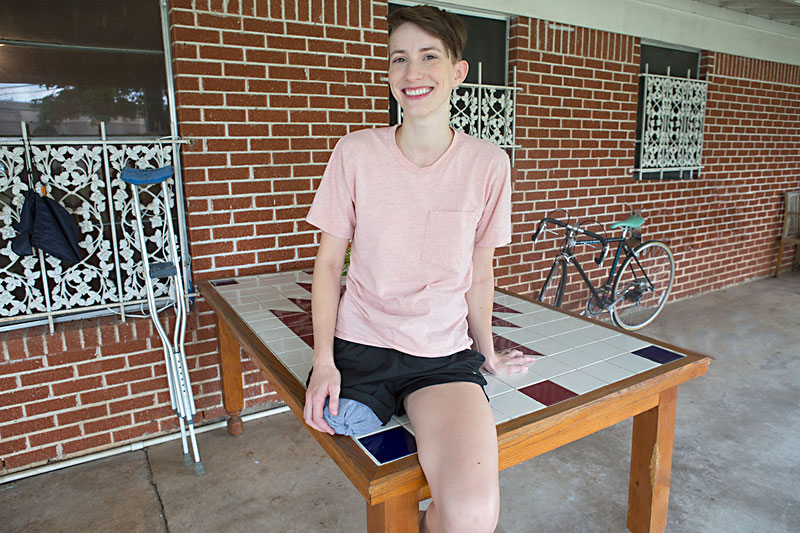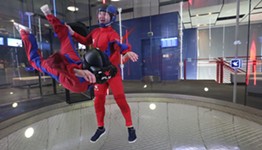An Unforeseen Cost
Elizabeth English wasn't supposed to live. Now she struggles to recover after a devastating hit-and-run.
By Nina Hernandez, Fri., July 8, 2016
Each morning, Elizabeth English tackles another form. Another phone call. Another medical bill.
Three months ago, the 28-year-old University of Texas student was struck while riding her bicycle home from school. She couldn't brace herself for impact, but she remembers catching a glimpse of a nearby bus stop from underneath the Dodge Ram that hit her, and that continued to barrel down Martin Luther King Jr. Boulevard.
The trauma to English's body was devastating. Though she was able to protect her head, her back and lower body were rubbed raw as she was dragged 2,000 feet. When she finally dislodged from underneath the truck, lying in a pool of blood, there was no skin left on her back to cover her spine. Her right leg would eventually be amputated.
Mo Aziz, English's lawyer, routinely handles cases involving catastrophic injuries, and, like some of English's doctors, said it is one of the worst he's seen. "She is a young girl who had a very promising future," he said, "and her life will never be the same."
The driver, Artemio Avila, was arrested the next day by an off-duty Austin Police Department officer. He remains in county jail on a charge of failure to stop and render aid. In May, he was served a lawsuit requesting damages to pay for the more than $1 million in debt English has accumulated in the last few months. Still, Avila was not the owner of the truck, and all his cousin had was a $30,000 liability policy. English also had an underinsured motorist policy – worth $100,000, according to Aziz – which he emphasized doesn't come close to paying for the physical and financial toll this crash put on English.
Numbers like the $500 million price tag the city's Vision Zero report associates with injuries and fatal crashes in Austin every year do little to illustrate the impact to someone's life in this kind of situation. English, who has a B.A. in political science, currently lives in the shadow of that statistic, but she hopes one day she will be able to educate the community about pedestrian and cyclist safety. Part of that is addressing the bad driving behaviors that the Vision Zero report said cause nearly 80% of crash fatalities. (In English's case, the driver was questioned about driving under the influence, but wasn't apprehended until the next day. By that time, blood alcohol testing was pointless.)
Especially in the short term, the Ohio native's financial situation is dire. Before the crash, English waited tables while she worked on the prerequisites for med school, which she considered pursuing at UT's Dell Medical School. Right now, although she's "champing at the bit" to get back to school and start her life over, the reality of her recovery has finally sunk in.
"There's hundreds of dollars of medicine I'm on every month," English said. "I'm super happy and positive, but like, shit – the reality is really tough."
"It's like, you're gonna get the $30,000 the driver's cousin had on the vehicle," she continued. "That's not even one of my bills. I'm dealing with the in-the-moment as much as I can. ... Now that I'm feeling better, I'm eager to move on and get back to life. I had a candy craving today and I'm like, 'I need to go to the store and get a candy to feel better.' It just seems so wrong."
English didn't have a sweet tooth before the crash. She was an active person who walked the 45 minutes from her Eastside home to school at UT. She had lights on her bike, wore a helmet, and had never been in any kind of accident before. Now she gets winded making chocolate chip cookies in her kitchen, which is small enough for her to traverse without much help.
Media reports and people in the community who have interacted with English since the crash note how positive and upbeat she is considering all she's been through in the last three months. While she is both of those things, she also deals with growing anger about what happened, and the financial and physical impact it will have on her for the rest of her life.
And in terms of the emotional aspect, English counts it as "another cost" she isn't equipped to handle at the moment. Part of her daily task list is trying to secure funds for a prosthetic leg that English hopes will allow her to return to school and realize her dream of becoming a psychiatrist. The possibility that it could take more than two years to materialize is daunting.
"We're working with CommUnityCare to get some of this other stuff," she said. "I have a pro bono urologist and this plastic surgeon – and pretty much [those are] the only two doctors I have. I need a primary care physician, but I lost insurance because I can't serve anymore, and I had it through my job. While you wait for Medicaid, you can't really have insurance. Because if you have insurance, they won't give you insurance."
Securing additional insurance beyond Medicaid, English said, is "going to be a huge next step for me being able to continue with the American dream."
As with Vision Zero's goal to eliminate all traffic fatalities, the American dream right now seems far out of English's grasp. Yet, though she may be discouraged, her resilience shone when discussing a video she'd seen of a double amputee riding a bike.
"I will probably ride down bike trails in the woods without cars near me," she admitted. "[But] being active is what I want. It's a richer life."
To donate to English's medical expenses, visit www.gofundme.com/bethenglish. View the Facebook page that chronicled her recovery at www.fb.com/bethenglishrecovery.
Editor's note: An earlier version of this story referred to English's pro bono neurologist, when in fact she has a pro bono urologist.
Got something to say on the subject? Send a letter to the editor.










